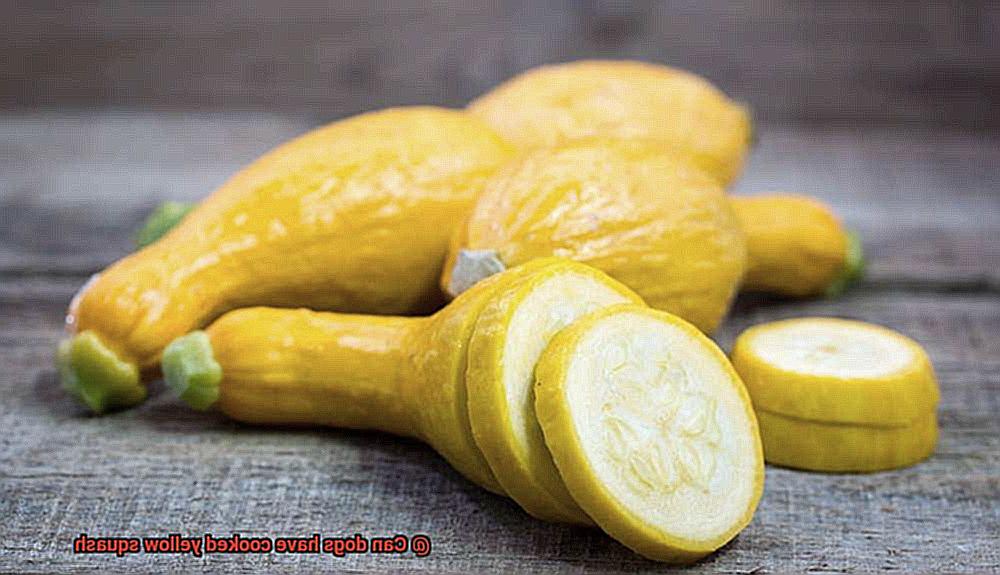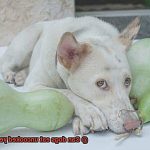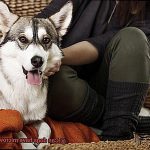Can dogs have cooked yellow squash?
Hey there, dog lovers.
Contents
- 1 Nutritional Benefits of Yellow Squash for Dogs
- 2 Preparing Cooked Yellow Squash for Dogs
- 3 Serving Size Considerations for Feeding Dogs Cooked Yellow Squash
- 4 Potential Risks of Feeding Dogs Cooked Yellow Squash
- 5 Signs of Allergic Reactions to Cooked Yellow Squash in Dogs
- 6 Alternatives to Feeding Dogs Cooked Yellow Squash
- 7 Tips on Introducing Cooked Yellow Squash to Your Dog’s Diet
- 8 Conclusion
Looking for a healthy and tasty treat for your furry friend? Well, look no further because today we’re talking all about cooked yellow squash for dogs.
We all know how important it is to keep our pups happy and healthy, and that includes watching what they chow down on. Yellow squash has been getting some serious attention lately as a nutritious side dish for us humans.
But can our four-legged pals get in on the squash action too? Stick with me as we dig into the potential benefits of adding cooked yellow squash to your dog’s diet.
Say goodbye to any doubts you may have and get ready to discover a whole new way to spoil your pooch.
Nutritional Benefits of Yellow Squash for Dogs
While meat is an essential part of their diet, incorporating fruits and vegetables can offer numerous health benefits. One vegetable that deserves attention is yellow squash. In this article, we will explore the nutritional benefits of yellow squash for French Bulldogs and how to incorporate it into their diet.
Packed with Essential Vitamins:
Yellow squash is a nutrient powerhouse, especially when it comes to vitamins. It contains high levels of vitamin A, which promotes healthy vision, supports immune function, and contributes to a lustrous coat. Vitamin C is another key nutrient found in yellow squash, known for its antioxidant properties, boosting the immune system, and aiding in collagen production for healthy joints and tissues. Vitamin B6 plays a vital role in metabolism and the proper functioning of the nervous system.
Rich in Beneficial Minerals:
In addition to vitamins, yellow squash is also abundant in minerals that are essential for your French Bulldog’s overall health. Potassium helps maintain hydration levels, supports muscle and nerve function, and regulates blood pressure. Manganese contributes to the formation of connective tissues, bones, and cartilage while playing a role in metabolism and antioxidant defense.
Low-Calorie Option:
Weight management is crucial for French Bulldogs as they are prone to obesity. Yellow squash is a low-calorie vegetable that can be included in their diet without worrying about excessive calorie intake. It offers a satisfying crunch while providing valuable nutrients.
Fiber for Digestive Health:
Yellow squash is an excellent source of dietary fiber, which aids in digestion and promotes regular bowel movements. Fiber also contributes to weight management by creating a feeling of fullness and preventing overeating.
Feeding Tips:
- Cooked and Mashed: To ensure easy digestion and nutrient absorption, it is important to cook yellow squash thoroughly. Steam or boil the vegetable until it is soft and easily mashed. Avoid feeding raw squash as it can cause digestive upset.
- Balanced Diet: Yellow squash should be offered as a supplemental treat or addition to your French Bulldog’s regular meals. It should not replace their primary source of nutrition.
- Moderation is Key: While yellow squash is beneficial, it should be fed in moderation. Start with small portions and monitor for any adverse reactions. If any digestive issues or allergies occur, consult with your veterinarian.
Preparing Cooked Yellow Squash for Dogs
Look no further than the humble yellow squash. In this guide, we’ll dive into the art of preparing cooked yellow squash for your beloved Frenchies. So grab your chef hats, let’s get cooking.
Selecting the Perfect Squash:
To ensure the utmost quality and safety, opt for fresh and organic yellow squash. By choosing organic, you can steer clear of any unwanted pesticides or harmful chemicals. Give the squash a good wash under running water to remove any stubborn dirt or debris.
Peeling and Slicing:
Now it’s time to get your peeling skills on point. Use a trusty vegetable peeler or a knife to remove the tough skin from the yellow squash. This step is crucial because Frenchie jaws are adorable but delicate. Slice the squash into bite-sized pieces, making it easier for your furry friend to munch on.
Cook it Up:
There are two popular methods for cooking yellow squash: boiling and steaming.
- Boiling: Add your sliced yellow squash to a pot of boiling water and cook until tender (around 5-7 minutes). Remember, we’re aiming for softness here.
- Steaming: Place your sliced yellow squash in a steamer basket over boiling water and let it steam until tender (around 8-10 minutes). Voilà.
Cool Down and Serve:
After cooking, allow the yellow squash to cool down before serving it to your Frenchie. We wouldn’t want any burnt tongues or uncomfortable mouths, now would we?
Moderation is Key:
While yellow squash is a fantastic addition to your Frenchie’s diet, remember that balance is key. Serve it as a special treat or incorporate it into their regular meals. Too much of a good thing can lead to digestive woes, and we want to keep those little tummies happy.
Introduce Gradually:
Just like humans, dogs can have allergies or sensitivities. When introducing cooked yellow squash for the first time, start with small portions and monitor your Frenchie for any adverse reactions. We want to make sure they’re loving it as much as we do.
Serving Size Considerations for Feeding Dogs Cooked Yellow Squash
Serving Size Considerations for Feeding Your French Bulldog Cooked Yellow Squash
If you’re a proud owner of a French Bulldog, you know how important it is to provide them with a balanced and nutritious diet. One way to add a healthy twist to their meals is by incorporating cooked yellow squash. However, determining the appropriate serving size can be a bit tricky. In this article, we’ll explore some factors to consider when feeding your French Bulldog cooked yellow squash.
- Size and Age: French Bulldogs come in different sizes, ranging from small to medium. The serving size of cooked yellow squash should be adjusted according to your Frenchie’s size and age. As a general guideline, you can start by offering around 1 to 2 tablespoons of cooked yellow squash per 10 pounds of body weight. For example, if your Frenchie weighs 20 pounds, you can offer them 2 to 4 tablespoons of cooked yellow squash.
- Activity Level: The activity level of your Frenchie also plays a role in determining the serving size. If your Frenchie is highly active and burns more calories, you can offer them slightly more cooked yellow squash. On the other hand, if your Frenchie is more sedentary, you may want to adjust the serving size accordingly.
- Health Considerations: It’s always important to consider any existing health conditions or dietary restrictions your Frenchie may have. Some dogs may have sensitivities or allergies to certain foods, including yellow squash. If your Frenchie has any specific dietary needs or restrictions, it’s best to consult with a veterinarian before introducing cooked yellow squash into their diet.
- Introduction and Observation: When introducing cooked yellow squash into your Frenchie’s diet for the first time, it’s important to start with smaller portions. This allows you to observe how your Frenchie reacts to the new food. Look for any signs of digestive upset, such as diarrhea or vomiting. If your Frenchie handles the new food well, you can gradually increase the serving size over time.
- Variety is Key: While cooked yellow squash can be a healthy addition to your Frenchie’s diet, it’s important to remember that variety is key. Dogs require a balanced diet that includes a mix of proteins, carbohydrates, and fats. Cooked yellow squash should be offered as part of a well-rounded meal plan and not as the sole source of nutrition.
- Preparation and Cooking: When preparing cooked yellow squash for your Frenchie, make sure to cook it thoroughly and remove any seeds or skin that may pose a choking hazard. Avoid using any seasonings or additives that may be harmful to dogs, such as salt, garlic, or onion powder.
Potential Risks of Feeding Dogs Cooked Yellow Squash
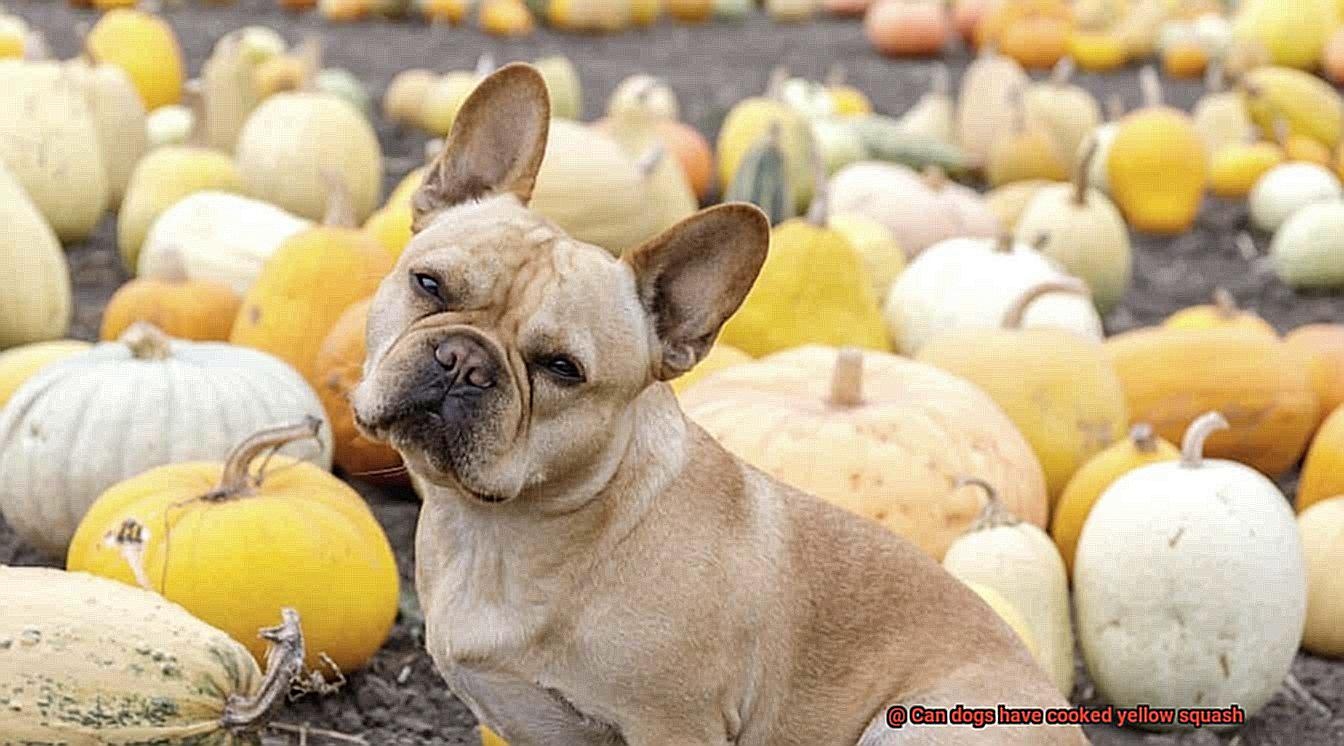
We all want the best for our furry friends, especially when it comes to their nutrition. Cooked yellow squash can be a tasty and nutritious addition to your pup’s diet. However, it’s important to be aware of the potential risks associated with feeding dogs cooked yellow squash. Let’s delve into these risks and ensure the well-being of our beloved Frenchies.
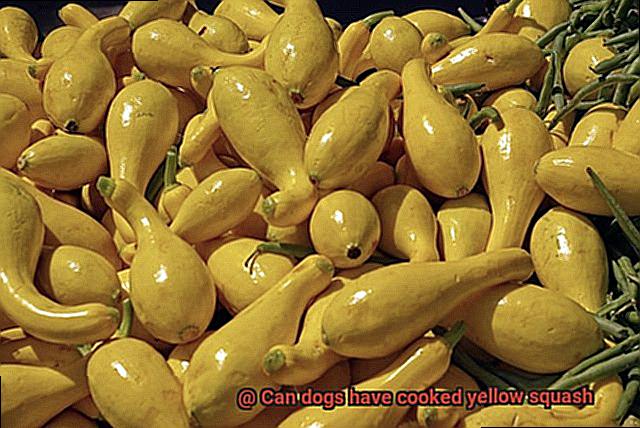
Gastrointestinal Upset:
Cooked yellow squash, like any new food, can cause digestive upset in some dogs. Symptoms such as diarrhea, vomiting, or gas may occur. To avoid this, introduce cooked yellow squash gradually into your dog’s diet and monitor their response closely.
Allergic Reactions:
While allergies to vegetables like squash are rare in dogs, they can happen. Signs of an allergic reaction may include itching, redness or swelling of the skin, hives, or difficulty breathing. If you notice any of these symptoms after feeding cooked yellow squash to your Frenchie, consult your veterinarian for further guidance.
Toxic Compound: Cucurbitacin
Cooked yellow squash contains a compound called cucurbitacin which can be toxic to dogs in large quantities. However, the amount of cucurbitacin in a normal serving of cooked yellow squash is unlikely to be harmful. Still, excessive consumption could lead to digestive upset or even more severe symptoms like muscle weakness or seizures. As always, moderation is key.
Digestive Issues:
Some dogs may have difficulty digesting cooked vegetables, including yellow squash. This can be due to factors such as a sensitive stomach or a lack of necessary digestive enzymes. If you notice any signs of discomfort or indigestion in your Frenchie after consuming cooked yellow squash, consult your veterinarian for guidance.
Introduce Gradually:
When introducing any new food into your dog’s diet, including cooked yellow squash, it’s essential to do so gradually. Start with small amounts and monitor your Frenchie’s response before increasing the quantity. This will help minimize the risk of digestive upset.
Signs of Allergic Reactions to Cooked Yellow Squash in Dogs
French Bulldogs are adorable and lovable companions, but like all dogs, they can develop allergies to certain foods. While yellow squash is generally considered safe for dogs to eat, it’s important to be aware that some French Bulldogs may have an allergic reaction to cooked yellow squash. As an expert in canine nutrition and health, I want to share with you the signs of allergic reactions to cooked yellow squash in French Bulldogs, so you can keep a close eye on your furry friend’s well-being.
- Itching and Redness: One of the most common signs of an allergic reaction in French Bulldogs is itching and redness. If you notice your Frenchie scratching excessively or rubbing their face against furniture or carpets, it could be a sign of an allergic reaction.
- Swelling and Hives: Allergic reactions can also cause swelling and hives on your French Bulldog’s skin. Check their body for any raised bumps or areas that appear swollen.
- Gastrointestinal Issues: French Bulldogs with a yellow squash allergy may experience gastrointestinal symptoms such as vomiting, diarrhea, bloating, or gas. Keep an eye on your Frenchie’s bathroom habits and look out for any changes in their stool consistency or frequency.
- Respiratory Problems: In severe cases, allergic reactions can lead to respiratory issues in French Bulldogs. If you notice your Frenchie coughing, wheezing, or having difficulty breathing after consuming cooked yellow squash, seek immediate veterinary care as this could indicate anaphylaxis.
- Other Possible Signs: While the above symptoms are the most common signs of an allergic reaction, it’s important to remember that every dog is unique. Your French Bulldog may exhibit other signs of an allergic reaction such as behavioral changes, lethargy, or changes in appetite.
If you suspect that your French Bulldog is having an allergic reaction to cooked yellow squash, it’s crucial to seek veterinary care. A veterinarian can diagnose the allergy through various tests and provide appropriate treatment options. They may recommend antihistamines to manage the symptoms or allergen-specific immunotherapy for long-term relief.
In terms of prevention and management, it’s essential to introduce new foods gradually and monitor your French Bulldog’s response. If your Frenchie has a known allergy to yellow squash, it’s best to avoid it altogether and opt for other safe vegetables like carrots or green beans instead.
Alternatives to Feeding Dogs Cooked Yellow Squash
French Bulldogs are not only adorable, but they also have unique dietary needs. If your Frenchie has a known allergy to cooked yellow squash or you’re simply looking for some variety in their diet, there are plenty of alternatives that can provide similar nutritional benefits. Let’s explore some options together.
- Cooked Carrots: Carrots are a great alternative to yellow squash as they are packed with vitamins and minerals, including beta-carotene, which is essential for eye health. Cooked carrots are easily digestible for dogs and can be added to their meals or used as a healthy snack.
- Sweet Potatoes: Sweet potatoes are another excellent alternative that offers a range of nutrients such as fiber, potassium, and vitamins A and C. You can cook them by baking or boiling, and then mash them up for your Frenchie to enjoy.
- Green Beans: Green beans are low in calories but high in fiber, making them a fantastic option for dogs who need to watch their weight. They are also a good source of vitamins K and C. You can steam or boil them before serving to your furry friend.
- Fruits: Adding fruits to your Frenchie’s diet can provide them with additional vitamins and antioxidants. Safe options include apples (without seeds), bananas, and blueberries. These fruits are not only delicious but also offer various health benefits.
- Lean Meats and Fish: Adding lean meats like chicken or turkey, as well as fish such as salmon or sardines, can provide your Frenchie with high-quality protein and essential amino acids for muscle growth and repair. Make sure the meat is thoroughly cooked and any bones removed before serving.
- Commercial Dog Food: If you prefer a convenient option, commercial dog food can be an excellent choice. Look for high-quality brands that offer a balanced diet with a mix of vegetables, fruits, and meats. Be sure to check the ingredients and consult your veterinarian for recommendations.
- Supplements: To ensure your Frenchie receives all the necessary vitamins and minerals, you can consider adding supplements to their diet. Fish oil supplements can support healthy skin and coat, while multivitamins can provide additional nutrients.
Remember, it’s crucial to consult with your veterinarian before making any changes to your Frenchie’s diet or introducing new foods. They can offer guidance based on your dog’s specific needs and health condition.
Tips on Introducing Cooked Yellow Squash to Your Dog’s Diet
French Bulldogs are adorable and playful companions that deserve the best care and nutrition. As a responsible pet owner, you may be wondering if it’s safe to introduce cooked yellow squash into your furry friend’s diet. Well, you’re in luck. This article will provide you with valuable tips and insights on how to safely incorporate this nutritious vegetable into your French Bulldog’s meals.
Start Slowly and Observe:
When introducing any new food to your dog’s diet, it’s essential to start slowly. Begin by offering small amounts of cooked yellow squash as a treat or mixed in with your dog’s regular food. Observe their reaction closely for any signs of discomfort or digestive issues.
The Power of Nutrients:
Yellow squash is a nutritional powerhouse. It contains essential vitamins like A, C, and K, which support your dog’s immune system and promote healthy skin and coat. Additionally, yellow squash is rich in minerals like potassium and magnesium, which aid in digestion. These nutrients can contribute to your French Bulldog’s overall well-being.
Preparation is Key:
Before serving cooked yellow squash to your dog, peel it and remove the seeds. The skin and seeds can be difficult for dogs to digest and may cause tummy troubles. Cut the squash into small, bite-sized pieces to make it easier for your furry friend to eat.
Proper Cooking Methods:
To ensure the best digestion for your French Bulldog, cook the yellow squash thoroughly. Raw squash can be challenging for dogs to process and may lead to gastrointestinal issues. Choose from steaming, boiling, or baking methods until the squash becomes soft and tender.
Moderation is Key:
While cooked yellow squash is a healthy addition to your dog’s diet, it should never replace their regular meals. Offer it as an occasional treat or mix it in small portions with their regular food. A balanced diet is crucial for your French Bulldog’s overall health.
cxIu1brzF8w” >
Conclusion
In conclusion, it is safe and beneficial to feed your furry friend cooked yellow squash.
This vibrant vegetable is packed with essential nutrients that can contribute to their overall health and well-being. So go ahead, whip up a tasty dish of cooked yellow squash for your canine companion and watch their tail wag with delight.
Remember to always consult with your veterinarian before making any significant changes to your dog’s diet.
